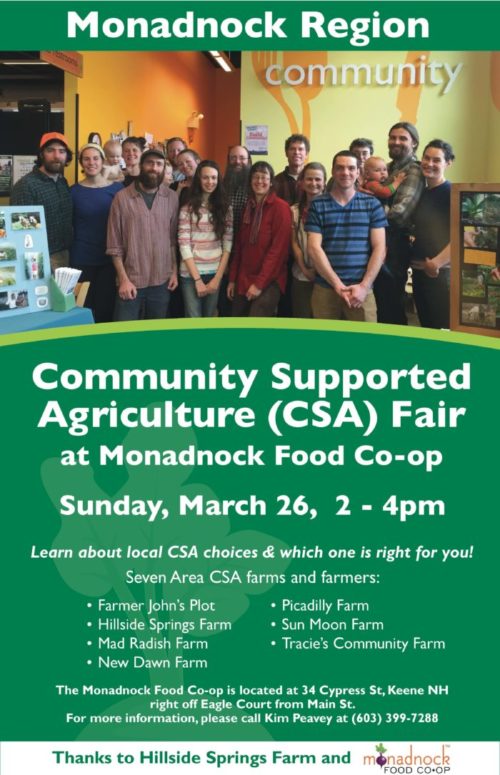Considering investing in a CSA farm share this growing season?
Stop by the Monadnock Food Co-op’s Cafe on Sunday, March 26 from 2-4pm for the 2017 Monadnock Region CSA Fair to learn about the range of options from different farms in the Monadnock Region. Chat with the farmers from Hillside Springs Farm, Picadilly Farm, Mad Radish Farm, Sun Moon Farm, Farmer John’s Plot, New Dawn Farm and Tracie’s Community Farm about what options they have available for this season and find the farm share that fits your needs and preferences.
Although each local CSA farm is unique and individually run, each offers “shares” of locally grown food to community members. There are variations in the price, share size, distribution, choices, pick-up sites, payment plans and variety of food offered. Some CSA farms concentrate on vegetable production, while others offer eggs, meat, flowers, berries, maple syrup, honey, raw milk, cheese, yogurt, or other local products.
The commitment from community members to join a CSA implies a willingness to share with the farmer in both the rewards and risks of small-scale farming. Weather, pest damage, and crop failures affect both the farmer and the shareholder; allowing the community to share in the costs of raising food in sustainable ways. The shareholders know when, where, and how their food is grown, and are assured of high-quality and nutritious produce.
A CSA membership supports local farms and the local economy, eliminating the environmental impacts and costs associated with marketing, packaging, and shipping food long distances. Freshly picked, locally grown fruits and vegetables are an excellent value because they have superior flavor and more vitamins and minerals than many large-scale commercially raised crops. Sustainable farm practices also avoid the hidden costs of pesticide residues, soil erosion, and polluted surface ground water which are often associated with large scale conventional agriculture.
Local farmland in CSA use often becomes healthier through crop rotation, composting, cover crops, natural fertilizers, and periodic resting. In addition, small farms often grow heirloom or little-known varieties of fruits and vegetables, which helps maintain the diversity and vitality of the world’s seed bank.
CSA farms benefit our communities in so many ways, why not sign up for one today?!
